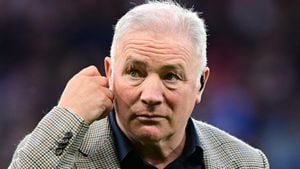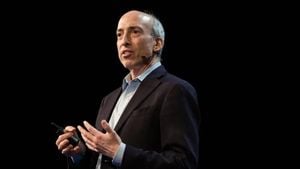The U.S. economy is riding on the wave of recent decisions made by the Federal Reserve, as central bank policymakers navigate the shifting political and economic landscapes. A dramatic quarter-point interest rate cut was announced on Thursday, which unfolded amid concerns about the electoral fallout from Donald Trump's unexpected victory. Fed Chair Jerome Powell stood firm, reitering the bank's independence amid political pressures.
The interest rate adjustment brought the target range down to between 4.50 and 4.75 percent—a decision made unanimously by the Federal Open Market Committee (FOMC). This move is expected to ease loan costs for consumers, thereby lightening the financial burdens weighing on many households, especially those grappling with rising living expenses and mortgage rates.
Powell addressed the situation confidently, declaring, "The near term impacts of the election will have no bearing on our policy decisions." He indicated the Fed’s commitment to basing its actions on data rather than conjecture, as freshly elected officials put forth their economic agendas. The cautious approach among the FOMC is indicative of its long-standing principle of steering clear of political turbulence.
Given the ensuing uncertainty, Powell's statement may come as relief to many. Acknowledging the dynamic nature of the economy, he emphasized the Fed's focus on core inflation rates and employment statistics to guide future monetary policies.
This latest rate cut follows September's half-point reduction—making it clear the Fed is committed to easing the financial strain on Americans, particularly those most affected by inflation. Current inflation gauges show signs of stabilization, reporting at 2.1 percent in September. This is particularly significant, considering many consumers have reported challenges with their cost of living, which surged by more than 20 percent post-pandemic.
Interestingly enough, the political environment surrounding the Fed's decisions is shifting. With Trump now at the helm, questions linger about the future of the Fed and its leadership. Trump's previous criticisms of Powell—including accusations about bias toward Democrats—raise concerns about how this administration might influence the independence of the central bank.
Within this backdrop of uncertainty, the markets—and the Fed—are weighing their options. Analysts theorize the central bank will have to make delicate decisions as it contemplates future interest rate adjustments, particularly with personnel changes looming at the Fed. Trump has indicated desires to appoint officials aligned with his economic perspectives, leading to potential shifts within the governing body.
Jim Bullard, former president of the St. Louis Fed, weighed in on the situation, expressing hopefulness about the resilience of the U.S. economy: "Generally speaking, the U.S. economy looks quite resilient, and the labor market still looks very good." This news reportedly stems from within the office of the FOMC, hinting at optimistic growth trends.
The interplay between monetary policy and political dynamics will remain pivotal as new leadership approaches the onset of 2025. With the potential for partisan division as both the House and Senate tilt toward Republican control, the balance of power could shape economic policies for years to come.
Economists are alert to the possibility of shifts as fiscal discipline has faltered across both parties, leading to concerns over long-term economic policies. Powell's stance may be somewhat reassuring to those wary of partisan influences on the central bank, as he reassured the press, "Firing any of our leaders isn’t permitted under law," emphasizing the regimented nature of the Fed's structure.
It's clear Washington's political climate could influence the economy dramatically. With the specter of inflation and post-election changes looming large, the Fed faces urgent challenges linked to its core mandate: achieving maximum employment and stable prices. The actions they take now and the responses from the market will set the tone for the country as it heads toward the new political era.



